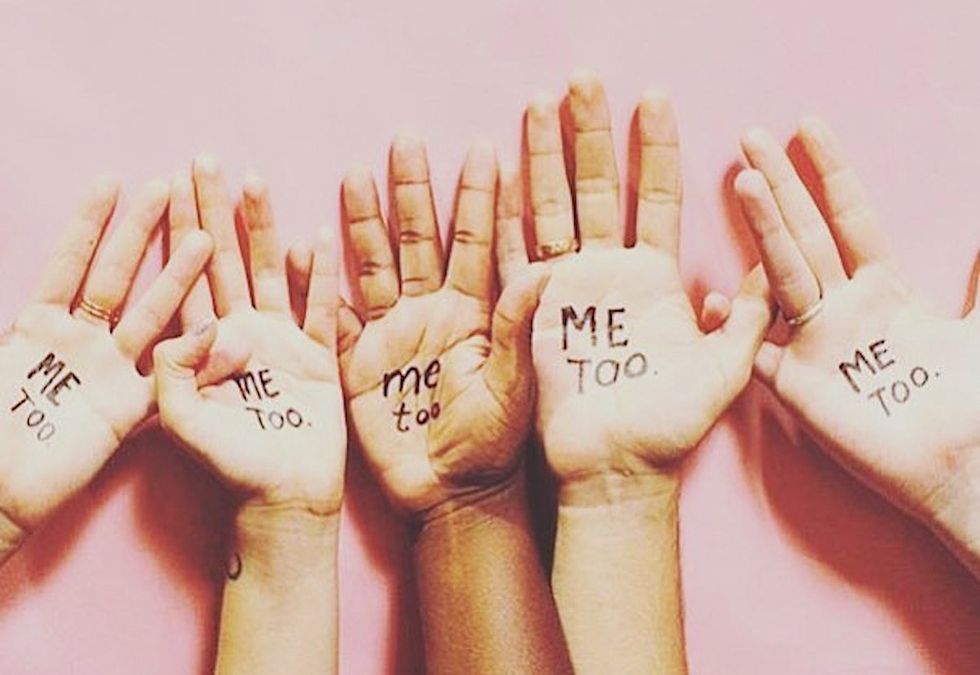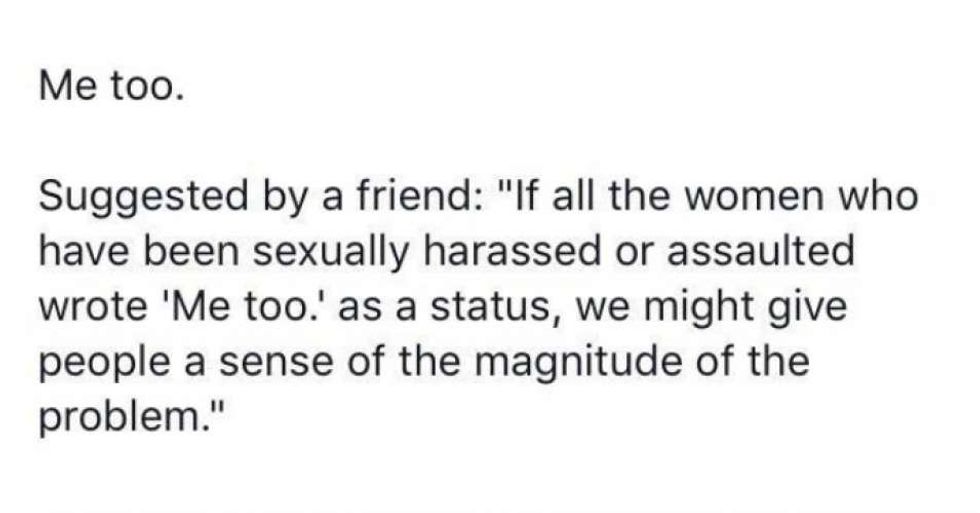On October 15, 2017, "Me too" statuses began appearing all throughout social media.
The first status I read simply said "Me, too," but as the hours passed, more and more friends on my Facebook feed posted anything from simply those two words, to the above suggestion, to their personal stories of sexual assault.
From the get-go, I wanted to write "Me too" as my status as well. But I stopped myself when I asked, "But have I ever been sexually assaulted?"
I wanted to post in support of my friends, but writing the words, "Me too" would be a lie because, well, I haven't been assaulted.
Until I started thinking...
Yes, I've been cat-called. Yes, I've been eyed up and down inappropriately by men. Yes, I've been hit on and felt uncomfortable. But to me, I had never considered those to be sexual assault.
Some context about me is that, for a long time, anytime someone close to me shared that they were sexually assaulted I would ask, "What exactly happened?" Not in a demeaning way. I tried my best to explain they didn't have to say anything if it was too difficult. But I asked because I legitimately did not understand what the phrase "sexually assaulted" entailed.
In my mind, rape was a black and white term. But "sexually assaulted" was a different ballpark.
"I was sexually assaulted."
My mind would go:
"Were you raped? Groped? Is cat-calling included in that? Is there a line between sexual assault and rape?"
The more stories I heard, the more I understood. I don't know why it took so long. But when my best friend was sexually assaulted twice and described what she experienced, I stopped wondering.
But with that being said, the context of this article begins with this: I never quite understood the wide scope of sexual assault and what it entails. Which brings me what the title of this article gives away.
I was raped. But I didn't realize it.
It was the beginning of April 2016 –– my birthday weekend. If I remember correctly, just a few hours before midnight of my birthday.
I didn't want it. I said that multiple times.
I said, "Stop." Many times. He kept insisting. He went for it.
While it was happening, I said, "Stop." Every few seconds. "Please, stop..."
He kept going.
It hurt, and I told him that. Because of the pain, I begged him more –– over and over again –– to stop. But as it continued, my begging grew quieter until there was no more sound from me at all.
At that point, my body froze. I couldn't push him off anymore. I put my arms down. I couldn't fight any longer.
I let it happen.
It is actually because of the rape scene in 13 Reasons Why that I am able to put what happens during rape into words. You fight and resist until you realize that they are not going to stop, and suddenly you freeze.
I can't describe how or why it happens. But when I watched that, and then remember my experience, I see the similarity. I fought until I froze. I "let it happen." But that's not consent. I'll say it again. Freezing in the midst of a rape is not consent.
Exactly what happened after is still a blur. But I remember being quiet for a while. He was satisfied because he got what he wanted and thought it was consensual. It wasn't. I actually said to him, "You basically raped me."
He laughed because he thought I was joking. I wasn't. I left to shower. There, I cried.
I was confused. He was my boyfriend. Did he feel entitled to my body? Was he? Did he mean it? Maybe he really didn't know? In my mind, I let it happen. I kept telling myself, "I could have pushed him off. I could have been more forceful."
His laugh had dismissed my statement.
"You raped me."
"Haha, that's not rape," his laugh implied.
"I thought you liked it. That's why I kept going?"
That made me sick to my stomach.
That was only the beginning of the trauma. More happened that following week, and though I won't share the details here, it all traumatized me to the point where I did my best to forget that any of it happened once the drama passed. Especially the night I described.
After all, one coping method for trauma is to pretend that the event never happened.
For the past year, I have rarely thought about that night. I pushed it out of my mind and told myself it was nothing.
It was only today after reading so many "Me too" statuses that I began thinking about my own "sexual assault experiences," when this memory came back to me. For the first time since April of 2016, I asked myself, "Was it rape?"
I told you earlier that I used to have trouble defining sexual assault. In addition, my idea of rape had been molded by what social media always fed me.
Rape had to look like men having sex with me when I was drunk or blacked out, or someone kidnapping me and holding me down, violently attacking me and having his way. That was my idea of rape.
Not my significant other unable to take no for an answer and then telling me that he thought I wanted it, long after I told him multiple times to stop.
Rape by definition is,
Unlawful sexual intercourse or any other sexual penetration of the vagina, anus, or mouth of another person, with or without force, by a sex organ, other body part, or foreign object, without the consent of the victim.
The key phrases here are, "With or without force," and "Without the consent of the victim." By definition, I was raped.
I never verbally consented. I never consented. Somehow, my willpower and ability to fight diminished the more forceful he became. But I never consented, even if my body "let it happen."
It was heavy on my heart to share about my experience once I realized the reality of my experience. Especially if I spent more than a year pretending that it didn't happen.
And though I knew I needed to share, I kept asking myself, what would the takeaway of sharing this be? Especially if so many other women have had it worse than me.
What I want to leave you with is this:
1. My story, as all other women's stories, matter.
My story matters. Your story matters. No matter what the situation was. No matter how "big" or "small" the assault was, it happened. It was real. Your experience matters. You overcame it.
It doesn't matter what people say. It doesn't matter if men tell you that you are being over-dramatic. You are not. It was your body. You had the right to say no. You have the right to know that it wasn't your fault. You have the right to know that, even after it has happened, you are still worth it. You still matter.
2. We, as a society, need to continually fight for change on how this topic is handled.
This is only the beginning.
The guy this situation involved felt that his action wasn't wrong. I hear countless stories where the person committing the assault acts without believing it is wrong. Where did this mentality begin?
And if I had spent so much time believing that my experience couldn't be classified as "assault" because it involved a significant other or wasn't inherently "violent," where did that idea begin?
The truth is that we are emerging out of society's warped mindset of sexual assault, where the victim is always to blame or the assault has to "look" a certain way for it to be taken seriously.
I see that a generation is rising that will no longer stand with that.
I am so proud of all the women and men who have shared their, "Me Too" statuses. Sexual assault IS an issue that needs to be discussed.
Continue sharing your stories. Continue allowing your voice to be heard. Overcome your fear and the belief that speaking up will only lead to more pain. The change begins with us. It begins with those who have experienced and see the scope of the issue.
We are not alone, and we will continue to stand together until some kind of tangible change is seen. No matter how long it takes.
So if you are a victim, don't worry.
Me too.

















